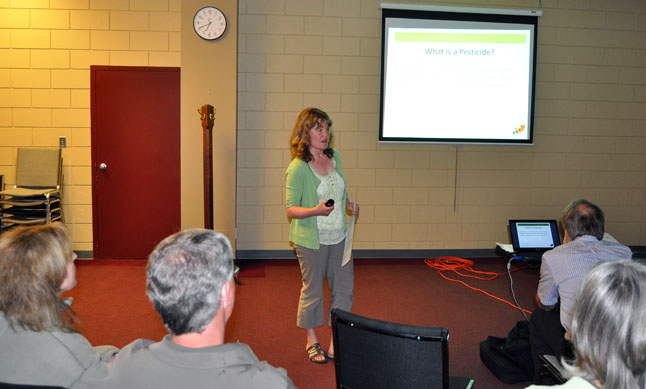
By David F. Rooney
The use of cosmetic pesticides on residential and municipally owned property may now be banned in Revelstoke, but that doesn’t mean your lawn needs to become a massive weed bed.
Environmental Sustainability Coordinator Penny Page-Brittin told attendees at an open house Thursday evening that there are several effective, naturally based alternative weed killers on the market that will take care of your dandelion problem and five simple steps you can follow to maintain a green and healthy lawn:
- mowing at a high setting;
- leaving grass clippings on the lawn to form a mulch;
- watering deeply — about 2.5 centimetres — once a week;
- aerating and de-thatching your lawn as needed; and
- over-seeding thin patches.
Homeowners who attended the open house were concerned that some people might use the pesticide ban as an excuse to let their yards become unkempt weed jungles. However, Engineering and Public Works Director Brian Mallett said the Unsightly Premises Bylaw allows the City to go after residents really let things go.
“We’re counting on people to do the right thing,” he said.
The ban become official this past week when Council approved third final reading of the bylaw banning cosmetic pesticides. At least one resident said people who know how to properly apply chemical pesticides should be allowed to use them, but Mayor David Raven said that’s not going to happen because the community in general is concerned about the effect of chemical pesticide use on health and the environment.
School yards and City parks and playing fields have been chemical-free for years and most parks look pretty good, Raven said.
With this ban in place, Revelstoke becomes the 37th BC municipality to ban the use of cosmetic pesticides; more than 170 towns and cities across the country have banned them. They are also heavily controlled by six provinces. The BC government is being lobbied to follow suit.



